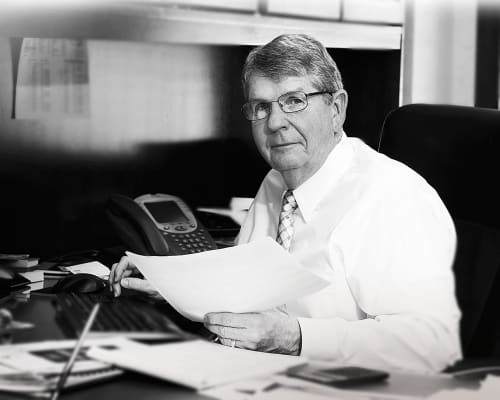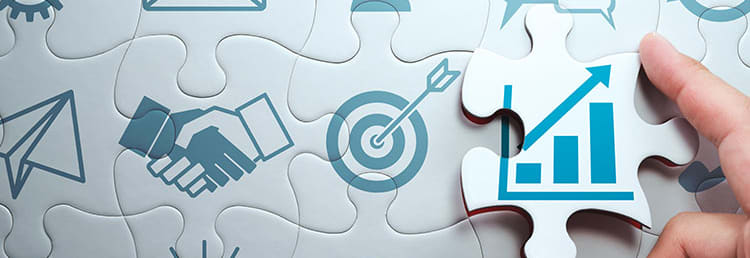5 LESSONS
I'VE LEARNED FROM BUILDING A BUSINESS
Written By: Larry Stevens
Back in 1991 when Brent and I and 2 other partners started Med One, it seems like we violated all of the rules of entrepreneurialism. Conventional wisdom about starting a business dictate that basically the rational steps would be:

- Determine a business concept.
- Conduct market research and research the competition.
- Write a business plan.
- Choose a business structure.
- Arrange for business funding.
- Choose a name for your business.
- Take care of all licensing and registrations.
- Open a bank account.
- Find customers.
We had been working for one of the premier medical equipment rental companies in the United States at which we were all doing very well with our concept of combining a leasing capability with a short-term rental business focused entirely on serving acute care hospitals. Without much warning, our employers decided to sell their company to a much larger firm. The sale was very good for the owners, but it left many of us in a state of uncertainty about our own future opportunities. Because we were already doing for someone else what we believed we could do in a new venture, we sort of bypassed steps 1 through 4 and just forged ahead.
Having arranged for some funding, we quickly took care of steps 6 through 8 and were ready to focus on # 9 – finding customers. As it turns out, finding customers was much easier than finding enough of the right kind of funding. We basically “outran” our financial backer’s capacity. It was at that point that we had to search our hearts, assess whether we had the courage and the passion to really embark on this journey.
Believing that we were basically sound with our business concepts, structure, and approach to the market, we took that dreaded step “off the plank” and into the exciting world entrepreneurialism.
For a few years we had to walk a tight rope trying to make a sound concept work without having sufficient funding. Those were very lean times. Every decision had to be considered from the dual position of—do we really need to do this, and how are we going to pay for it? During this time, personal compensation was uncertain and often unavailable.

I often think of Med One as a 30-year overnight success. It took at least 10 years for us to reach a level of profitability coupled with enough critical mass to give us the confidence that we were sitting on a strong enough foundation that we could legitimate begin planning to build for the future. By this time the other two founding partners had retired and been bought out, leaving the ownership of the company with Brent and myself. We made a fundamental decision to reinvest all our profits first into repaying the debts that had piled up during our lean times and then into making the company stronger and more self-sufficient.
This decision for us has proven to be monumental and providential. The result of maintaining this discipline for the past 20 years has placed us in an unbelievable situation. First, we have successfully repaid everyone who has ever believed in us and had the faith to extend credit. Second, we have built a substantial foundation of retained capital which has made it possible for Med One to weather many severe economic storms and unforeseen challenges. Both Brent and I take great comfort that we are at the helm of an organization that is not built upon the uncertainty of debt
Today Med One is reviewing many opportunities from a position of strength and capability. We have created a strong team of managers and employees who share our vision of culture and have embraced the mission and goals of Med One. Our fundamental philosophy as a company is to do the right thing for our customers in every and all cases - at a fair price. We know that there are others in our business who have found a myriad of ways to take advantage of customers in a negative way. In every case, Med One has chosen to reject those types of methods in the spirit of being true partners who are trying to provide for the best interest of our customers. We are reliant upon our strong and committed work force to actually carryout and implement this vision. Our hope is, of course, that we will be rewarded for taking the high road and delivering long-term, real value to those with whom we are fortunate enough to do business.
When I reflect upon our 32 years of history as a company and my personal involvement, I realize that I have learned some important lessons along the way. Some of these are reinforcement of things I already knew, and others represent new understanding that has dawned on me through experience and time.
-
Customers control your destiny.
There is an old Jewish proverb that says, “Don’t open a shop unless you know how to smile.” To me that means that friendliness, responsiveness, and fairness are critical in building a customer centered business. That was (and continues to be) a bedrock principle when we founded Med One. Many, many of the relationships that we and our other team members have developed over the years with vendors and customers have turned into close and lasting friendships.
-
Follow your passion.
This is high on the list of almost everyone who has ever spent any time in the business world. As a Chinese philosopher famously said: “Choose a job you love, and you will never have to work a day of your life.” I had the advantage of starting a business in the arena that I have always enjoyed and done well at throughout my entire working career. I didn’t necessarily start out thinking that equipment leasing and rental were a passion, but over the years, as I’ve seen the way our business has helped so many people; as I get involved in the challenging opportunity to structure a unique solution for a customer; and as I witness the way that what we have done has blessed so many lives in so many different ways, I realize that this is indeed my passion.
-
Trust Yourself.
At Med One, we have always been willing to act in a counter intuitive way. Much of our success has come from being prepared to do things that other people were not willing or able to do. Opportunities do not last forever, and we have tried not to lose those opportunities by being trapped by the dogma of living with the results of other people’s thinking. We have tried to make our decision based on what was right, and what would solve the customer’s problem at the time. To be sure, we have been criticized for this but, in reality, it has been one of the keys to our success.
-
Expect Failures.
One of the down sides of operating in a counter intuitive way is that you get plenty of opportunity to experience failure. We have made plenty of decisions that have not worked out as we had planned. We’ve even had some abject failures that have cost us dearly. Bill Brady, one of our board members, often reminds us of the quote by Harry S. Truman – “Imperfect action always beats perfect inaction.” While we have been able to recover from our failures, we would never be able to recover from the losses of never trying. I’ve learned that failure is not the end of everything – but it is often a new beginning. An amazing revelation for me has been that over time, many of the failures that we thought we had have ultimately turned into solid successes and turned out much better than we could have ever planned.
-
Don’t be in a hurry to spend the profits.
The old adage is that entrepreneurship is living a few years of your life like most people won’t so you can spend the rest of your life living like most people can’t. In the beginnings of Med One, we certainly learned how to live like most people won’t. They were lean and uncertain times for sure. As I stated above, we have chosen to, for the most part, invest our profits back into the company. This has proven to be a tremendous benefit to Med One and it has been the reason that so many of our employees have such great opportunities here at Med One. There is an Irish proverb that says, “If you buy what you don’t need, you might have to sell what you do.” I have observed that entrepreneurial based companies that get into trouble fail because the founders were too quick to start enjoying the “finer things of life.”
I am grateful for the things I have learned as I have had the opportunity to help build this company from the modest beginnings of 1991. Life for us at Med One is much different now than it was then. The successes we’ve witnessed have in many ways astounded me – particularly with the benefit of hindsight. I am better indeed for having experienced the lessons of this growth. There is an Irish proverb that says, “The best things in life are the people we love, the places we have been and the memories we have made along the way.” I would say without hesitation that the creation and building of Med One represents for me the best things in life in every respect.
I will end with one more Irish proverb, “A good friend is like a four-leaf clover: hard to find and lucky to have.” I would say that the best thing that I have been able to achieve from all of this has been the opportunity that I have had to be able to build this amazing company alongside my partner Brent Allen. He is a good friend, and I am lucky to have him.
Imperfect action always beats perfect inaction.
- HARRY S. TRUMAN

